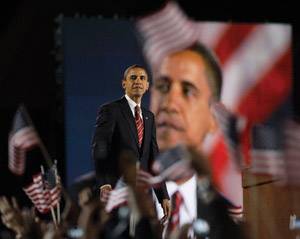Obama becomes first black president-elect

President-elect Barack Obama looks out into the crowd after his acceptance speech at Grant Park in Chicago on Tuesday night, Nov. 4, 2008. (AP Photo/David Guttenfelder)
November 5, 2008
History has been made.
Sen. Barack Obama, D-Ill., has become the first black man in U.S. history to be elected president Tuesday.
While Obama clinched the popular vote with a 3 percent margin, he overwhelmingly carried the electoral college vote.
“If there is still anyone out there that still doubts that America is a place where all things are possible, who still wonders if the dreams of our founders is still alive in our time, who still questions the power of our democracy — tonight is your answer,” Obama said to a crowd of thousands at Grant Park in Chicago.
Obama spoke of how Americans wanted their voice to be heard, and said this election they were looking for change.
“It’s the answer spoken by young and old, rich and poor, Democrat and Republicans, black, white, Hispanic, Asian, Native American, gay, straight, disabled and not disabled,” Obama said. “Americans have sent a message to the world that we have not been just a collection of individuals or just a collection of red states and blue states, but we are and always will be the United States of America.”
Sen. John McCain, R-Ariz., conceded the race to Obama shortly after 10 p.m. in Phoenix. McCain congratulated Obama on becoming the first black man to win the presidency and called for Americans to come together as one.
“Sen. Obama has achieved a great thing for himself and for his country,” McCain said. “I urge all Americans who supported me to join me in not just congratulating him but offering our next president our good will and earnest effort to find ways to come together.”
Crucial wins in Ohio and Pennsylvania, followed by a win in California, put Obama over the required 270 electoral votes.
Obama took an early lead capturing his home state of Illinois as well as a block of states in the northeast, including Massachusetts, New Jersey, New York and Maryland. Obama also took Pennsylvania early on, a traditionally Democratic state and major focus for McCain’s campaign in the weeks leading up to Nov. 4.
While Obama took the North, McCain fought back hard in the South carrying Georgia, Tennessee, Alabama, South Carolina and Texas. McCain also carried states in the west with Arizona, Utah and the Dakotas.
Eric Marsh cq, graduate student in mechanical engineering and president of ISU Democrats, said the youth vote definitely came out and helped carry Obama to victory.
“I was working until 9 o’clock telling people in the dorms to get out and vote, and most people in the dorms have voted,” Marsh said. “So I think the student vote got out really well.”
Marsh said Obama’s presidency will lead America back in the right direction and will “even the playing field” economically for the average American.
“It’s really promising,” Marsh said. “It’s a very historic change.”
Samantha Clark, senior in political science and president of ISU College Republicans, said she originally thought McCain would win, but knew the Republicans got “on the wrong foot” when Sen. Elizabeth Dole, R-N.C., lost her incumbent seat. Although Republicans lost ground on the national scene, Clark said she was happy with local results, especially Tom Latham’s win.
“We put up a good fight, and we kept our morals high,” Clark said.
Clark said the youth vote was definitely a factor in Obama’s win and other wins around the state, because many students come from out of state and vote straight ticket Democrat.
“It’s good to see people involved,” Clark said. “But since they are from out of state they are not really represented.”
Clark said it was nice to see so many people getting involved in the campaign and she urged others to get involved as well.
“It’s exciting to see so many people involved,” Clark said. “The more people that are exercising their rights and civil liberties the better.”
















